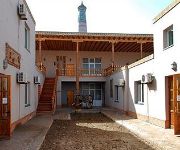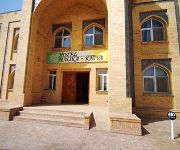Facts and Data
Webpages:
Official Unesco Page
View photos from OUR PLACE the World Heritage collection
Organisation des villes du patrimoine mondial (OVPM)(only in French)
Basis Data:
Unesco World heritage since: 1990
Size of heritage: 38 ha
Coordinates:
Longitude: 60,364°
Latitude: 41,378°
Summary
Itchan Kala is the inner town (protected by brick walls some 10 m high) of the old Khiva oasis, which was the last resting-place of caravans before crossing the desert to Iran. Although few very old monuments still remain, it is a coherent and well-preserved example of the Muslim architecture of Central Asia. There are several outstanding structures such as the Djuma Mosque, the mausoleums and the madrasas and the two magnificent palaces built at the beginning of the 19th century by Alla-Kulli-Khan.
Location on Map
Show bigger map on Openstreetmap
Introduction
Itchan Kala, located in the Khorezm region of Uzbekistan, is a UNESCO World Heritage site that holds immense historical and cultural significance. This ancient walled city, situated in the city of Khiva, is a remarkable example of Islamic architecture and urban planning. Itchan Kala has witnessed the rise and fall of empires, and its well-preserved structures offer a glimpse into the rich history of the region.
History
The origins of Itchan Kala can be traced back to the 6th century when it served as a trading post along the Silk Road. However, it was during the 16th century that the city flourished under the rule of the Khiva Khanate. Itchan Kala became a center of Islamic learning and culture, attracting scholars, artisans, and merchants from across Central Asia.
Over the centuries, Itchan Kala faced numerous invasions and conquests, including those by the Persians, Arabs, and Russians. Despite these challenges, the city managed to retain its unique architectural and cultural heritage. Itchan Kala's fortifications, gates, mosques, madrasas, and palaces have stood the test of time, providing a tangible link to the past.
Current State
Today, Itchan Kala stands as a living testament to the grandeur of the Khiva Khanate and the Islamic civilization of Central Asia. The walled city covers an area of approximately 26 hectares and is home to over fifty historic structures.
One of the most prominent landmarks within Itchan Kala is the Kunya-Ark fortress, which served as the residence of the Khiva Khans. This fortress, with its towering walls and ornate gates, offers a glimpse into the opulent lifestyle of the ruling elite. Inside, visitors can explore the Khan's reception hall, harem, and treasury.
The Juma Mosque, another architectural gem within Itchan Kala, dates back to the 10th century. Its distinctive wooden pillars and intricately carved ceilings make it a must-visit site for tourists and scholars alike. The mosque's minaret provides a panoramic view of the city, allowing visitors to appreciate the beauty of Itchan Kala from above.
Itchan Kala is also home to several madrasas, or Islamic schools, such as the Muhammad Amin Khan Madrasa and the Allakuli Khan Madrasa. These educational institutions played a crucial role in the intellectual and cultural development of the region. Today, they serve as museums, showcasing artifacts and exhibits that shed light on the history of Islamic education in Central Asia.
Preservation Efforts
Recognizing the historical and cultural significance of Itchan Kala, UNESCO designated it as a World Heritage site in 1990. This recognition has helped raise awareness about the importance of preserving the city's architectural and cultural heritage.
The Uzbek government, in collaboration with international organizations, has undertaken various preservation and restoration projects to ensure the long-term survival of Itchan Kala. These efforts include the repair and maintenance of historic structures, the establishment of visitor centers, and the implementation of sustainable tourism practices.
By safeguarding Itchan Kala, Uzbekistan is not only preserving its own heritage but also contributing to the global understanding and appreciation of Islamic civilization and the Silk Road trade routes.
Conclusion
Itchan Kala, with its rich history and well-preserved architecture, stands as a testament to the cultural and intellectual achievements of the Khiva Khanate and the Islamic civilization of Central Asia. This UNESCO World Heritage site offers visitors a unique opportunity to step back in time and immerse themselves in the vibrant history of the region. Through ongoing preservation efforts, Itchan Kala will continue to inspire and educate future generations about the importance of cultural heritage.
Hotels and places to stay
Hotel Malika Kheivak
Malika Khiva
Videos from the area
Videos provided by Youtube are under the copyright of their owners.








